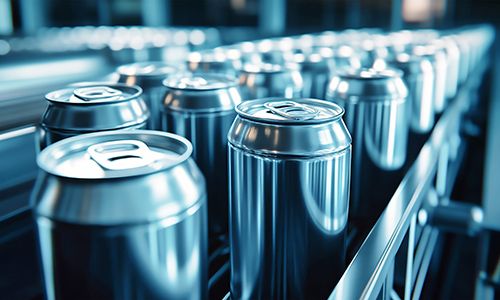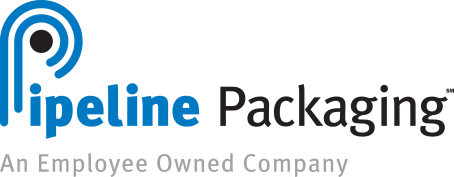Everyone has a favorite refreshment. From sodas to juices to beers and more, there’s a limitless supply of beverages ready for your enjoyment.
Recent trends in the industry have led to the rise of a new category, functional beverages — a result of a growing emphasis on personal health and wellness. Energy drinks, prebiotic sodas, electrolyte drinks, and even THC- and CBD-infused beverages are just a few of the category’s most popular selections.
As consumer tastes have changed, so too have manufacturers’ approaches to their beverage packaging design.
In its nearly 40-year history, Pipeline Packaging has seen it all. As a packaging distributor, we leverage our nimble nature to meet your company’s every need, from accommodating modern packaging design to minimizing marginal costs.
Aluminum Cans Take the Lead

Pipeline Packaging account manager Brian Crevar helps provide packaging to firms in the beverage industry. His customers include craft breweries and the formulators behind today’s THC and CBD beverages.
Crevar noted how a crowded market, rising costs, and changing motivations have moved consumers away from traditional alcoholic beverages. The shift has caused a noticeable decline among craft breweries, causing many to reconsider their beverage packaging design to reduce costs and appeal to consumers.
“Glass bottles were once the standard for craft breweries,” said Crevar. “Today, most of my customers have made the transition to aluminum cans for several reasons. They’re lighter than glass bottles, reducing weight during transportation.
They’re also a lot more durable, protecting you from breaks. And, ultimately, cans are less expensive.”
When it comes to shelf space, aluminum cans carry another obvious beverage packaging design advantage compared to glass bottles.
“You can fit way more cans on a supermarket shelf compared to glass bottles,” added Crevar. “It gives customers the opportunity to save money on packaging while making more product readily available to consumers.”
In the wake of declining demand, breweries are not only toying with switches from glass to aluminum but also adjusting their packaging volume.
“Some of the breweries have made the decision to sell their products in 12-ounce aluminum cans instead of the 16-ounce varieties,” he said. “Still, there are customers who prefer the larger-volume cans and feel they suit their brand better.”
Pipeline Packaging leverages its advantage as a distributor to provide craft brewery customers with their preferred standard blank 12-ounce and 16-ounce aluminum cans as well as the accompanying standard stock beer can ends. In some cases, aluminum can orders can be delivered the next day straight from the warehouse.
Pipeline can begin supplying these packaging needs with only a one-pallet order minimum and even offers dunnage pick-up services that issue customers credits for returned pallets. Members of the team like Brian Crevar make themselves readily available to provide these services and savings opportunities in an effort to accommodate every customer's needs.
Tapping into the Right Beverage Packaging Design
Aligning your beverage packaging design to modern appetites can take more than a change in material. In some cases, it may involve attention to other details like carrier composition, refreshed labels, and can end closures.
Crevar explained some of the ways beverage manufacturers like craft brewers are taking a different approach with their packaging.
“Many craft breweries have made the decision to switch their packaging to smaller-volume cans, and others have reduced the number of cans in each carrier pack,” said Crevar. “For instance, a customer may switch from selling six-packs to four-packs. Whether a different can or new carrier packs, Pipeline can assist in modifying systems to minimize costs.”
Like the primary can component, Pipeline maintains a thorough stock of beer carriers, ranging from four-packs to six-packs in a variety of colors, that will securely fit any order of standard aluminum cans.
Other components, like brand labels and closure selections, are critical in completing any beverage packaging design. Through a robust inventory and full suite of value-added services, Pipeline helps craft breweries and other beverage customers with tasks such as artwork proof approval and beverage product-to-can compatibility, which is conducted by testing beer samples alongside the manufacturer to ensure printed can products work with a specific liner.
“The direct litho print transforms these aluminum cans with the branding of each brewery,” said Crevar. “We can print customers’ logo designs directly on the can, or we sell blank cans so the brewery can label on its own fill line. It all depends on their preferences.”
Though some breweries handle the entirety of their labeling for their beverage packaging design process, Pipeline Packaging maximizes customers’ manufacturing flexibility and provides every possible method for helping operations achieve optimal efficiency.
Industry Case Study: THC and CBD Beverages
Besides the alcohol market, there have been other emergent trends in beverage packaging design, namely the growing popularity of CBD- and THC-infused beverages.
Growth in this beverage segment stems from consumers’ prioritization of personal health and wellness — the same factor contributing to the decline in alcohol sales. In fact, alcohol consumption decreased from 72% to 62% over the course of a decade among adults under 35. Likewise, 20% report regular CBD usage, and more than 40% have cited THC usage within the past year.
CBD and THC beverages are available in almost any variety to suit the tastes of nearly every consumer. Beverage packaging designs often accommodate products like sparkling waters, seltzers, teas, coffees, juices, energy drinks, and even select beers.
Often, consumers point to CBD’s ability to reduce stress and encourage relaxation as reasons why they choose these innovative formulations. Others cite its anti-inflammatory, mental sharpness, and sleep-support capabilities. CBD and THC beverages can also provide similar effects as traditional alcohol, without concern for hangovers.
Though many choose to enjoy CBD and THC beverages for these unique benefits, it’s important to consider the role beverage packaging design plays in communicating the benefits of these modern drinks while meeting current compliance standards.
Crevar shared his experience helping a new THC beverage manufacturer make packaging decisions that met its specific needs.
“We helped one customer outfit its lineup of THC beverages with primary packaging that accentuated its innovative character with all the perks of an aluminum can,” said Crevar. “Ultimately, the customer selected sleek, tall 12-ounce cans to strike the right balance.”
Regulation is another reality many manufacturers, suppliers, and distributors must consider regarding beverage packaging design. When it comes to packaging these products, CBD and THC manufacturers are responsible for meeting regulations, which can differ between each state.
As a packaging industry expert, Pipeline Packaging assists its customers with regulatory due diligence. Through partnerships with our customers and suppliers, the team at Pipeline can get a closer look at the concerns facing each industry, including CBD and THC products. With careful consideration, Pipeline Packaging partners with customers to ensure they understand and fulfill their obligations to beverage-packaging-design-compliance standards, like age-restriction notices and content warnings.
Become Kindred Spirits with Pipeline Packaging
Pipeline Packaging works with a broad spectrum of industries — from automotive aftermarket to chemical cleaners to beverage products. As a company with broad experience, we understand our customers’ need to adjust their packaging systems according to market trends and factors like production cost.
When it comes to tackling changes in industries like those facing the craft brewery and CBD and THC beverage markets, Pipeline knows the beverage packaging design solution lies in strong partnerships.
“We like to partner with our beverage customers,” said Crevar. “We’re a team working together to supply exactly what you need, when you need it.”
He explained how a partnership with Pipeline can set operations up for success.
“Our strong point for many customers is our warehouse space,” he said. “Smaller craft breweries usually don’t have the room to store bulk aluminum can orders. Pipeline gives these customers access to almost 1 million square feet of warehouse space, where they can house the beverage packaging design components they need.”
Beyond warehousing services, Pipeline also allows customers to take advantage of bulk pricing and supply through guaranteed stocking agreements.
“With stocking agreements, a brewery can ensure its desired level of aluminum cans is in stock for an entire year,” explained Crevar. “Pipeline houses the bulk stock and releases it as needed, whether it’s one pallet, two, or five pallets of product.”
Using these stock agreements, Pipeline can store your designated product at a warehouse close to your operation. By closing the distance, we ensure customers experience reduced freight costs through local deliveries.
Craft breweries can count on Pipeline Packaging to not only have their beverage packaging stock available but also the warehouse space to house items as needed. We maintain a detailed list of product SKUs to make restocking your brewery’s perfect packaging system, from aluminum cans to labels to carriers to can ends, an effortless process.
In addition, Pipeline only issues invoices at the time the product is released, rather than the customer paying one large invoice upfront. This saves customers money while guaranteeing they have the components they need.
Making a packaging switch can be daunting, especially when it hinges on fluctuating market trends. As your partner, Pipeline Packaging brings exceptional dexterity and an array of value-added services to keep the products of craft breweries and other beverage manufacturers on shelves and in the hands of consumers.
Are you considering a new approach to beverage packaging design? Contact us today to learn how strong partnerships and industry expertise can reshape this vital component in your operation.


